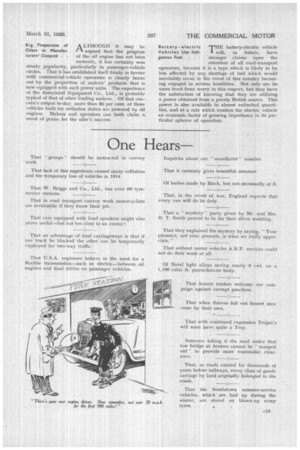One Hears
Page 67

If you've noticed an error in this article please click here to report it so we can fix it.
That " groups " should be instructed in convoy work. 0 That lack of this experience caused many collisions and the temporary loss of vehicles in 1914.
That W. Briggs and Co., Ltd., has over 60 tyreservice stations.
That in road transport convoy work motorcyclists are invaluable if they know their job.
That cars equipped with loud speakers might also prove useful—but not toe close to an enemy!
That an advantage of dual carriageways is that if one track be blocked the other can be temporarily tinployed for two-way traffic.
That U.S.A. engineers believe in the need for a flexible transmission—such as electric—between oil engines and final driVes on passenger vehicles. Inquiries about our "munificent" number. That it certainly gives bountiful measure.
Of bodies made by Birch, but not necessarily of it.
That, in the event of war, England expects that every van will do its duty.
That a " mystery " party given by Mr. and Mrs. R. T. Smith proved to be for their silver wedding.
That they explained the mystery by saying, "Your presence, not your presents, is what we really appreciate."
That without motor vehicles A.R.P. services could not do their work at all.
Of Noral light alloys saving nearly 9 cwt. on a 1,100 cubic ft. pantechnicon body.
That honest traders welcome our campaign against corrupt practices.
That when thieves fall out honest men come by their own.
That with continued expansion Trojan's will soonhave quite a Troy.
Someone asking if the road under that low bridge at Aintree cannot be "scooped out" to provide more reasonable clearance.
That, as roads existed for thousands of years before railways, every class of goods carriage by land originally belonged to the roads.
That the Southdown summer-service vehicles, which are laid up during the winter, are stored on blown-up scrap tyres. •
























































































































































